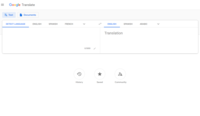
Photo from wikipedia
The main purpose of this paper is to examine how listeners’ experience (the extent of exposure to the non-native accented speech or the familiarity with the non-native accent) influences the… Click to show full abstract
The main purpose of this paper is to examine how listeners’ experience (the extent of exposure to the non-native accented speech or the familiarity with the non-native accent) influences the judgments of Non-native Korean Speech (NNKS), specifically Arabic-accented speech of Korean. Thirty-four native Korean language speakers were selected as listeners and were asked to rate Arabic-accented Korean speech of eight native Arabic speakers in terms of comprehensibility and accentedness. Half of the group was experienced with the Arabic language, and the other half was not, and only ten of them had experienced the Arabic language for a period of one year or more. As a result, the experienced group showed higher ratings in terms of comprehensibility, suggesting that the experience with non-native accent plays an important role in judging how easy to understand NNKS. The listeners showed significant differences in judging accentedness based on the length of their experience, in which the listeners with long experience showed higher sensitivity toward the degree of non-native accent. However, no significant difference was noticed in terms of comprehensibility or accentedness based on the listener’s cognition of his familiarity with Arabic-accented speech.
Journal Title: Language and Linguistics
Year Published: 2020
Link to full text (if available)
Share on Social Media: Sign Up to like & get
recommendations!